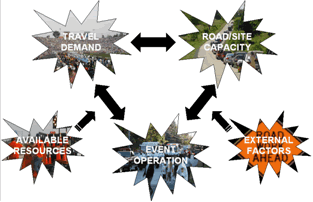
Managing Travel for Planned Special Events
Tri-Fold Brochure
November 2003
FHWA Report No.: FHWA-OP-04-033
EDL No.: 13903
ACHIEVING PREDICTABILITY
ENSURING SAFETY
MAXIMIZING EFFICIENCY

Planned Special Events
A planned special event is a public activity with a scheduled time, location and duration that may impact the normal operation of the surface transportation system due to increased travel demand and/or reduced capacity attributed to event staging.
Planned special events include sporting events, concerts, festivals, and conventions occurring at permanent multi-use venues (e.g., arenas, stadiums, racetracks, fairgrounds, amphitheaters, convention centers). They also include less frequent public events such as parades, fireworks displays, bicycle races, sporting games, motorcycle rallies, seasonal festivals, and milestone celebrations at temporary venues.
The operational characteristics of planned special events create the following five event categories:
- Discrete/recurring event at a permanent venue
- Continuous event
- Street use event
- Regional/multi-venue event
- Rural event
What is Managing Travel for Planned Special Events?
Managing travel for planned special events involves advanced operations planning, stakeholder coordination and partnerships, developing a multi-agency transportation management plan, raising awareness of general public and event patrons of potential travel impacts, and coordinating agency services and resource sharing.
The goals of managing travel for planned special events are:
- Achieving predictability
- Ensuring safety
- Maximizing efficiency
- Meeting public & event patron expectations
Challenges
Planned special events pose a unique and diverse set of challenges to stakeholders charged with maintaining transportation system safety, mobility, and reliability. These challenges include:
- Mitigate impacts of event-generated traffic
- Potential for heavy volume of transit vehicles and pedestrian flows
- Coordinate travel management activities with event operator and overall planning team
- Available staff resources and support services
- Infrastructure lacking at event site to:
- Accommodate generated traffic
- Manage traffic
- Provide support services
Benefits
The proactive management of travel for planned special events yields numerous benefits to stakeholders and transportation system operations, including:
- Reduce traffic congestion
- Improve mobility
- Improve travel safety
- Form partnerships and build trust
- Promote interagency coordination, resource utilization and sharing
- Incorporate new procedures, plans, and practices into day-to-day operation of agencies
“Successful planned special events are essential to the economic
viability of many communities. They are a key component of the quality
of life that is nurtured within a state or region. Managing the highway
and transportation system during planned special events cannot be an afterthought,
but rather demands the leadership and active involvement of state and
local transportation agencies.” – John Corbin,
State Traffic Engineer, Wisconsin Department of Transportation
Regional Planning and Coordination
Regional planning and coordination concerns proactively improving travel management for all planned special events in a region. Key initiatives include:
- Interagency agreements
- Regional or consistent agency permit process
- Recommended travel management practices for specific categories of planned special events
- Technical teams formed to champion and carryout specific initiatives
- Assess and report on benefits of regional and event-specific activities
Regional planning and coordination initiatives facilitate more effective and efficient event-specific planning and operations for future planned special events.
Event-Specific Travel Management
The practice of managing travel for planned special events incorporates advance planning, management, and evaluation activities encompassing five distinct, chronological phases:
- Program planning encompasses advance planning activities completed months prior to a single, target event or activities related to a series of future planned special events.
- Event operations planning involves advance planning and resource coordination activities conducted for a specific planned special event.
- Implementation activities concern strategizing traffic management plan deployment in addition to conducting necessary equipment testing and personnel training activities.
- Day-of-event activities refer to the daily implementation of the traffic management plan in addition to traffic monitoring.
- Post-event activities cover the evaluation of local and regional transportation operations based on stakeholder debriefings and an analysis of traffic data collected during the day-of-event.
Additional Resources and Training
- Managing Travel for Planned Special Events Handbook; FHWA-OP-04-010, EDL# 13883
- Fact sheet; FHWA-OP-04-034, EDL# 13904
- Technical presentation – available on the TMC Pooled-Fund Study website
Other resources and tools include:
- NCHRP Synthesis 309: Transportation Planning and Management for Special Events
- Special Events Case Studies Report – PTI / FHWA
- NHI Course 133099, Managing Travel for Planned Special Events, FHWA-NHI-03-120 – 2005
- Repository of case studies and reports, http://tmcpfs.ops.fhwa.dot.gov
- ITS Peer-To-Peer Program, http://www.its.dot.gov

"Effectively managing planned special events requires a great deal of preparation by many stakeholders. Key considerations include establishing critical stakeholder partnerships, developing traffic control strategies, and understanding the importance, and benefits, to our customers of being proactive in effectively managing traffic for these events." – Mark Newland, ITS Program Director, Indiana Department of Transportation
“If we do not plan for planned special events then we must react to them and this results in the inefficient use of resources. The opportunity to explore options through advance planning, and build strong partnerships through discussion of alternatives, is the key to our success in managing planned special events.” – Robert Boggs, City Traffic Engineer, City of Daytona Beach, Florida
“Too often, planners for planned special events are not overwhelmed by the event itself, but by the effects of the event on the transportation system as a whole. Planning activities require a community-wide, multi-agency approach for managing transportation operations during planned special events. Such an approach has worked very well for us in San Antonio.” – Patrick Irwin, Director of Transportation Operations--TransGuide, Texas Department of Transportation, San Antonio District
For More Information:
The Managing Travel for Planned Special Events Handbook is available on the ITS Electronic Document Library at http://www.its.dot.gov and TMC Pooled-Fund Study website at http://tmcpfs.ops.fhwa.dot.gov
For information on the TMC Pooled-Fund Study, visit our website at
http://tmcpfs.ops.fhwa.dot.gov
Call the FHWA Operations “Help Line” toll-free (866) 367-7487
Planned Special Events Traffic Management | Privacy Policy